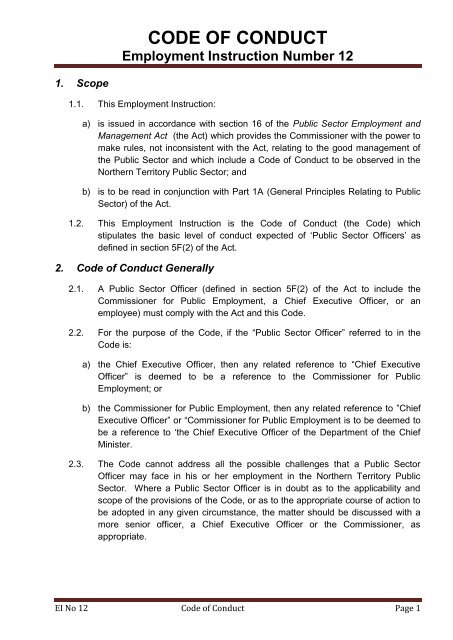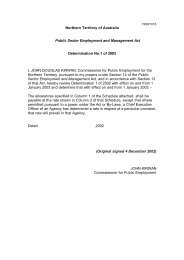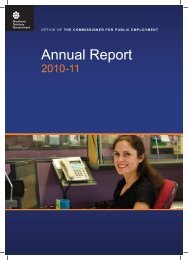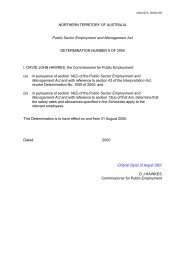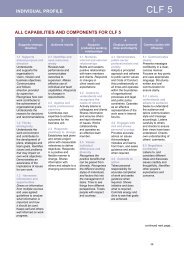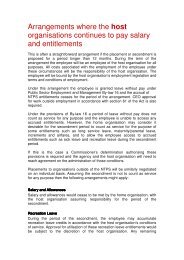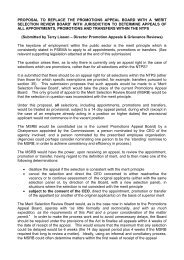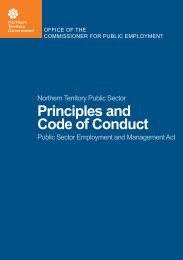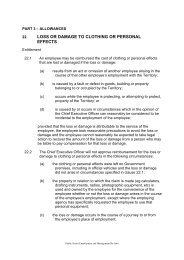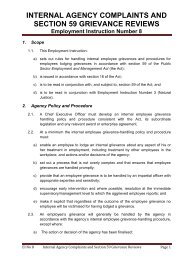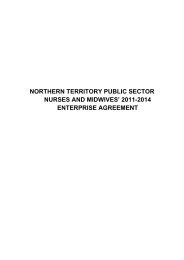Code of Conduct - Office of the Commissioner for Public Employment
Code of Conduct - Office of the Commissioner for Public Employment
Code of Conduct - Office of the Commissioner for Public Employment
You also want an ePaper? Increase the reach of your titles
YUMPU automatically turns print PDFs into web optimized ePapers that Google loves.
CODE OF CONDUCT<strong>Employment</strong> Instruction Number 121. Scope1.1. This <strong>Employment</strong> Instruction:a) is issued in accordance with section 16 <strong>of</strong> <strong>the</strong> <strong>Public</strong> Sector <strong>Employment</strong> andManagement Act (<strong>the</strong> Act) which provides <strong>the</strong> <strong>Commissioner</strong> with <strong>the</strong> power tomake rules, not inconsistent with <strong>the</strong> Act, relating to <strong>the</strong> good management <strong>of</strong><strong>the</strong> <strong>Public</strong> Sector and which include a <strong>Code</strong> <strong>of</strong> <strong>Conduct</strong> to be observed in <strong>the</strong>Nor<strong>the</strong>rn Territory <strong>Public</strong> Sector; andb) is to be read in conjunction with Part 1A (General Principles Relating to <strong>Public</strong>Sector) <strong>of</strong> <strong>the</strong> Act.1.2. This <strong>Employment</strong> Instruction is <strong>the</strong> <strong>Code</strong> <strong>of</strong> <strong>Conduct</strong> (<strong>the</strong> <strong>Code</strong>) whichstipulates <strong>the</strong> basic level <strong>of</strong> conduct expected <strong>of</strong> „<strong>Public</strong> Sector <strong>Office</strong>rs‟ asdefined in section 5F(2) <strong>of</strong> <strong>the</strong> Act.2. <strong>Code</strong> <strong>of</strong> <strong>Conduct</strong> Generally2.1. A <strong>Public</strong> Sector <strong>Office</strong>r (defined in section 5F(2) <strong>of</strong> <strong>the</strong> Act to include <strong>the</strong><strong>Commissioner</strong> <strong>for</strong> <strong>Public</strong> <strong>Employment</strong>, a Chief Executive <strong>Office</strong>r, or anemployee) must comply with <strong>the</strong> Act and this <strong>Code</strong>.2.2. For <strong>the</strong> purpose <strong>of</strong> <strong>the</strong> <strong>Code</strong>, if <strong>the</strong> “<strong>Public</strong> Sector <strong>Office</strong>r” referred to in <strong>the</strong><strong>Code</strong> is:a) <strong>the</strong> Chief Executive <strong>Office</strong>r, <strong>the</strong>n any related reference to “Chief Executive<strong>Office</strong>r” is deemed to be a reference to <strong>the</strong> <strong>Commissioner</strong> <strong>for</strong> <strong>Public</strong><strong>Employment</strong>; orb) <strong>the</strong> <strong>Commissioner</strong> <strong>for</strong> <strong>Public</strong> <strong>Employment</strong>, <strong>the</strong>n any related reference to ”ChiefExecutive <strong>Office</strong>r” or “<strong>Commissioner</strong> <strong>for</strong> <strong>Public</strong> <strong>Employment</strong> is to be deemed tobe a reference to „<strong>the</strong> Chief Executive <strong>Office</strong>r <strong>of</strong> <strong>the</strong> Department <strong>of</strong> <strong>the</strong> ChiefMinister.2.3. The <strong>Code</strong> cannot address all <strong>the</strong> possible challenges that a <strong>Public</strong> Sector<strong>Office</strong>r may face in his or her employment in <strong>the</strong> Nor<strong>the</strong>rn Territory <strong>Public</strong>Sector. Where a <strong>Public</strong> Sector <strong>Office</strong>r is in doubt as to <strong>the</strong> applicability andscope <strong>of</strong> <strong>the</strong> provisions <strong>of</strong> <strong>the</strong> <strong>Code</strong>, or as to <strong>the</strong> appropriate course <strong>of</strong> action tobe adopted in any given circumstance, <strong>the</strong> matter should be discussed with amore senior <strong>of</strong>ficer, a Chief Executive <strong>Office</strong>r or <strong>the</strong> <strong>Commissioner</strong>, asappropriate.EI No 12 <strong>Code</strong> <strong>of</strong> <strong>Conduct</strong> Page 1
3. Issuing <strong>of</strong> Agency Specific <strong>Code</strong> <strong>of</strong> <strong>Conduct</strong> or guidelines3.1. A Chief Executive <strong>Office</strong>r may issue an agency-specific code <strong>of</strong> conduct whichis consistent with <strong>the</strong> Act, its associated subordinate legislation, this <strong>Code</strong> andany o<strong>the</strong>r relevant legislation.4. Application <strong>of</strong> <strong>Code</strong> <strong>of</strong> <strong>Conduct</strong>4.1. This <strong>Code</strong> applies to all <strong>Public</strong> Sector <strong>Office</strong>rs. The <strong>Code</strong> is underpinned by <strong>the</strong><strong>Public</strong> Sector principles which are specified in Part 1A <strong>of</strong> <strong>the</strong> Act and set outbelow:a) Administration Management Principle;b) Human Resource Management Principle, including <strong>the</strong> Merit and <strong>the</strong> Equality <strong>of</strong><strong>Employment</strong> Opportunity Principles; andc) Per<strong>for</strong>mance and <strong>Conduct</strong> Principle.5. Familiarity with Principles5.1. A <strong>Public</strong> Sector <strong>Office</strong>r must familiarise him or herself with <strong>the</strong> <strong>Code</strong>, and <strong>the</strong>General Principles <strong>of</strong> Part 1A <strong>of</strong> <strong>the</strong> Act.6. Breach <strong>of</strong> Discipline6.1. Disregarding <strong>the</strong> <strong>Code</strong> and Part 1A <strong>of</strong> <strong>the</strong> Act, or acting in a mannerinconsistent with those principles, is a breach <strong>of</strong> discipline under section 49(a)<strong>of</strong> <strong>the</strong> Act.7. Standards7.1. In order to maintain public confidence in <strong>the</strong> integrity <strong>of</strong> <strong>the</strong> Nor<strong>the</strong>rn Territory<strong>Public</strong> Sector, a <strong>Public</strong> Sector <strong>Office</strong>r must exhibit, and be seen to exhibit <strong>the</strong>highest ethical standards in carrying out his or her duties, and must pursue, andbe seen to pursue, <strong>the</strong> best interests <strong>of</strong> <strong>the</strong> people <strong>of</strong> <strong>the</strong> Nor<strong>the</strong>rn Territory.8. Trust and Confidence8.1. It is essential <strong>for</strong> <strong>the</strong> proper working <strong>of</strong> Government that a <strong>Public</strong> Sector <strong>Office</strong>rretains <strong>the</strong> trust and confidence <strong>of</strong> his or her employer, colleagues and clientsin <strong>the</strong> manner in which he or she discharges his or her <strong>of</strong>ficial responsibilities.9. Personal and pr<strong>of</strong>essional behaviour9.1. In <strong>the</strong> per<strong>for</strong>mance <strong>of</strong> his or her duties, a <strong>Public</strong> Sector <strong>Office</strong>r must:a) exercise his or her best possible technical and/or pr<strong>of</strong>essional judgement;b) develop and maintain knowledge <strong>of</strong> his or her pr<strong>of</strong>essional field;EI No 12 <strong>Code</strong> <strong>of</strong> <strong>Conduct</strong> Page 2
c) commit time and energy to fur<strong>the</strong>ring <strong>the</strong> agency's purpose and achievements;d) be familiar with and comply with <strong>the</strong> requirements <strong>of</strong> <strong>the</strong> Act, <strong>the</strong> FinancialManagement Act and o<strong>the</strong>r legislative, industrial or administrative requirementsrelevant to his or her <strong>of</strong>ficial responsibilities;e) have regard to all <strong>of</strong>ficial guidelines concerning <strong>the</strong> per<strong>for</strong>mance <strong>of</strong> his or herassigned duties;f) provide all necessary and appropriate assistance to members <strong>of</strong> <strong>the</strong> public ando<strong>the</strong>r <strong>Public</strong> Sector <strong>Office</strong>rs;g) seek to obtain value <strong>for</strong> public money spent and avoid waste or excessive use<strong>of</strong> public resources;h) take reasonable care <strong>for</strong> his or her own, and o<strong>the</strong>rs, occupational health andsafety;i) follow reasonable directions relating to occupational health and safety;j) use relevant safety equipment provided; andk) report workplace accidents in accordance with occupational health and safetystandards and programs as soon as practicable after <strong>the</strong>y occur.10. Relationships between <strong>Public</strong> Sector <strong>Office</strong>rs and GovernmentSupport to Government <strong>of</strong> <strong>the</strong> day10.1. A <strong>Public</strong> Sector <strong>Office</strong>r must provide full support to <strong>the</strong> Government <strong>of</strong> <strong>the</strong> dayregardless <strong>of</strong> which political party or parties are in <strong>of</strong>fice.Advice to Government10.2. A <strong>Public</strong> Sector <strong>Office</strong>r is responsible <strong>for</strong> providing to Government advice whichis frank, independent, based on an accurate representation <strong>of</strong> <strong>the</strong> facts and ascomprehensive as possible. This includes setting out <strong>the</strong> advantages,disadvantages, costs and consequences <strong>of</strong> <strong>the</strong> available options and, whereappropriate, recommending a particular course <strong>of</strong> action.Implementation <strong>of</strong> Government policy10.3. A <strong>Public</strong> Sector <strong>Office</strong>r is also responsible <strong>for</strong> carrying out decisions andimplementing programs promptly, conscientiously and with full regard toGovernment policy. In implementing programs, a <strong>Public</strong> Sector <strong>Office</strong>r‟s ownvalues should not supplant those explicit or implicit in Government policy. It willbe necessary both in providing advice and in implementing programs toexercise judgement as to which facts or courses <strong>of</strong> action are most relevant orimportant. Judgement must, however, always be exercised with due regard toEI No 12 <strong>Code</strong> <strong>of</strong> <strong>Conduct</strong> Page 3
legislative requirements, Government policy or a supervisor's directions,toge<strong>the</strong>r with considerations <strong>of</strong> equity and efficiency.Contact with Minister and ministerial staff10.4. Contact between a Minister and ministerial staff is normally with <strong>the</strong> ChiefExecutive <strong>Office</strong>r. Where a Minister or ministerial staff member contacts anemployee directly, <strong>the</strong> employee must advise his or her Chief Executive <strong>Office</strong>r<strong>of</strong> <strong>the</strong> contact as soon as possible.11. Relationships between <strong>Public</strong> Sector <strong>Office</strong>rs and Members <strong>of</strong> <strong>the</strong> LegislativeAssembly11.1. Contact by Members <strong>of</strong> <strong>the</strong> Legislative Assembly who are not Ministers willusually be to make representations on behalf <strong>of</strong> a constituent or by a Member<strong>of</strong> <strong>the</strong> Opposition in relation to <strong>the</strong>ir duties as Opposition spokesperson onGovernment activities.Representations on behalf <strong>of</strong> a constituent11.2. Constituent representations must be channelled to, and/or received by, anappropriately senior <strong>Public</strong> Sector <strong>Office</strong>r who has responsibility <strong>for</strong> <strong>the</strong> subjectmatter <strong>of</strong> <strong>the</strong> representation.11.3. Written responses should, where possible, be cleared by a Chief Executive<strong>Office</strong>r prior to dispatch.11.4. Where an oral response is given, a <strong>Public</strong> Sector <strong>Office</strong>r shall ensure that alldue care is exercised in providing that response, particularly where <strong>the</strong> content<strong>of</strong> <strong>the</strong> in<strong>for</strong>mation is likely to be sensitive or constitute o<strong>the</strong>r than factualmaterial which is readily available elsewhere.11.5. If a <strong>Public</strong> Sector <strong>Office</strong>r is in any doubt about releasing in<strong>for</strong>mation, <strong>the</strong> advice<strong>of</strong> his or her Chief Executive <strong>Office</strong>r should be sought.11.6. Representations by Members <strong>of</strong> <strong>the</strong> Legislative Assembly do not confer anyprivilege or priority in dealings with agencies. In addition, a <strong>Public</strong> Sector<strong>Office</strong>r responsible <strong>for</strong> providing responses must, when contemplating release<strong>of</strong> such material, be mindful <strong>of</strong> legislation concerning <strong>the</strong> security, confidentialityor protocol governing certain categories <strong>of</strong> in<strong>for</strong>mation.Representation from an Opposition Spokesperson11.7. Opposition Spokespersons normally contact <strong>the</strong> Minister with portfolioresponsibility.11.8. In <strong>the</strong> absence <strong>of</strong> <strong>the</strong> Minister, <strong>the</strong> Spokesperson may contact a ChiefExecutive <strong>Office</strong>r. If a Spokesperson contacts a <strong>Public</strong> Sector <strong>Office</strong>r, anyEI No 12 <strong>Code</strong> <strong>of</strong> <strong>Conduct</strong> Page 4
equest must be referred back to his or her Chief Executive <strong>Office</strong>r <strong>for</strong>instructions prior to a written or oral response being provided.11.9. Fur<strong>the</strong>r, it should be noted that Opposition Spokespersons do not have a rightto access agency files and are not entitled, by virtue <strong>of</strong> <strong>the</strong>ir <strong>of</strong>fice, to beprovided with written or oral in<strong>for</strong>mation regarding future or proposed policies orstrategies.12. Relationship between <strong>Public</strong> Sector <strong>Office</strong>rs <strong>of</strong> <strong>the</strong> Legislative Assembly andMembers <strong>of</strong> <strong>the</strong> Legislative Assembly12.1. For <strong>Public</strong> Sector <strong>Office</strong>rs <strong>of</strong> <strong>the</strong> Department <strong>of</strong> <strong>the</strong> Legislative Assembly thissection takes precedence over any o<strong>the</strong>r sections in <strong>the</strong> <strong>Code</strong> which relate tocontact with Ministers and Ministerial staff, and relationships with Members <strong>of</strong> <strong>the</strong>Legislative Assembly.12.2. <strong>Public</strong> Sector <strong>Office</strong>rs <strong>of</strong> <strong>the</strong> Department <strong>of</strong> Legislative Assembly must:a) provide pr<strong>of</strong>essional advice and support <strong>for</strong> <strong>the</strong> Parliament independently <strong>of</strong> <strong>the</strong>Executive Government <strong>of</strong> <strong>the</strong> Nor<strong>the</strong>rn Territory;b) provide non-partisan and impartial advice and services to <strong>the</strong> Parliament,parliamentary committees and to all Members <strong>of</strong> <strong>the</strong> Legislative Assembly; andc) maintain appropriate confidentiality about dealings with <strong>the</strong> Parliament, withparliamentary committees and with Members <strong>of</strong> <strong>the</strong> Legislative Assembly.13. <strong>Public</strong> commentMeaning <strong>of</strong> public comment13.1. "<strong>Public</strong> comment" includes public speaking engagements (including commentson radio and television), expressing views in a letter to <strong>the</strong> press or in books orin notices, or „online‟ (e.g. social networking sites), and any o<strong>the</strong>r commentmade in circumstances where it is reasonably <strong>for</strong>eseeable that publication orcirculation <strong>of</strong> <strong>the</strong> comment will flow to <strong>the</strong> community at large.<strong>Public</strong> comment on Government matters13.2. Except where required by law, or as authorised by <strong>the</strong> responsible ChiefExecutive <strong>Office</strong>r, a <strong>Public</strong> Sector <strong>Office</strong>r must not make public comment onGovernment matters in an <strong>of</strong>ficial capacity.13.3. If authorised by <strong>the</strong> Chief Executive <strong>Office</strong>r, comments made by a <strong>Public</strong> Sector<strong>Office</strong>r must be confined to factual in<strong>for</strong>mation and must not, as far as possible,express an opinion on <strong>of</strong>ficial policy or practice unless required to do by <strong>the</strong>circumstances <strong>of</strong> <strong>the</strong> particular situation, e.g. when asked to do so in court.EI No 12 <strong>Code</strong> <strong>of</strong> <strong>Conduct</strong> Page 5
Circumstances in which public comment is inappropriate13.4. While a <strong>Public</strong> Sector <strong>Office</strong>r, as a member <strong>of</strong> <strong>the</strong> community, has <strong>the</strong> right tomake public comment and enter into public debate on political and socialissues, <strong>the</strong>re are some circumstances in which public comment isinappropriate. These include:a) <strong>the</strong> implication that <strong>the</strong> public comment, although made in a private capacity, isin some way seen to be an <strong>of</strong>ficial comment <strong>of</strong> <strong>the</strong> Government or <strong>of</strong> <strong>the</strong> <strong>Public</strong>Sector <strong>Office</strong>r‟s agency;b) where a <strong>Public</strong> Sector <strong>Office</strong>r is directly involved in advising on or directing <strong>the</strong>administration or implementation <strong>of</strong> Government policy and <strong>the</strong> public commentwould compromise his or her ability to continue to do so in an efficient andpr<strong>of</strong>essional manner; andc) where public comment, regardless <strong>of</strong> <strong>the</strong> connection (or lack <strong>of</strong> connection) witha <strong>Public</strong> Sector <strong>Office</strong>r‟s normal duties, amounts to criticism sufficiently strongor persistent to give rise to <strong>the</strong> public perception that <strong>the</strong> <strong>Public</strong> Sector <strong>Office</strong>r isnot prepared to implement or administer <strong>the</strong> policies <strong>of</strong> <strong>the</strong> Government <strong>of</strong> <strong>the</strong>day as <strong>the</strong>y relate to his or her duties.14. Use <strong>of</strong> in<strong>for</strong>mation acquired in <strong>the</strong> course <strong>of</strong> employmentDisclosure <strong>of</strong> in<strong>for</strong>mation acquired in <strong>the</strong> course <strong>of</strong> employment14.1. A <strong>Public</strong> Sector <strong>Office</strong>r must not disclose in<strong>for</strong>mation or documents acquired in<strong>the</strong> course <strong>of</strong> his or her employment, o<strong>the</strong>r than as required by law or whereproper authority has been given.Misuse <strong>of</strong> in<strong>for</strong>mation14.2. A <strong>Public</strong> Sector <strong>Office</strong>r must not misuse in<strong>for</strong>mation gained in his or her <strong>of</strong>ficialcapacity. Misuse includes, but is not limited to:a) speculation, <strong>for</strong> personal gain or o<strong>the</strong>rwise, in shares on <strong>the</strong> basis <strong>of</strong>confidential in<strong>for</strong>mation about <strong>the</strong> affairs <strong>of</strong> a business or <strong>of</strong> proposedGovernment action;b) seeking to take advantage <strong>for</strong> personal reasons or <strong>for</strong> ano<strong>the</strong>r person on <strong>the</strong>basis <strong>of</strong> in<strong>for</strong>mation about that person held in <strong>of</strong>ficial records;c) gossiping or rumour mongering on <strong>the</strong> basis <strong>of</strong> personal or o<strong>the</strong>r in<strong>for</strong>mationheld in <strong>of</strong>ficial records; andd) providing a <strong>for</strong>mer <strong>Public</strong> Sector <strong>Office</strong>r, or appearing to provide a <strong>for</strong>mer <strong>Public</strong>Sector <strong>Office</strong>r, favourable treatment or access to privileged in<strong>for</strong>mation.EI No 12 <strong>Code</strong> <strong>of</strong> <strong>Conduct</strong> Page 6
Integrity and security <strong>of</strong> documents and in<strong>for</strong>mation14.3. A <strong>Public</strong> Sector <strong>Office</strong>r must take care to maintain <strong>the</strong> integrity and security <strong>of</strong>documents or in<strong>for</strong>mation <strong>for</strong> which he or she is responsible (refer also<strong>Employment</strong> Instruction Number 9 - Employee Records).Freedom <strong>of</strong> in<strong>for</strong>mation14.4. A <strong>Public</strong> Sector <strong>Office</strong>r must ensure that <strong>the</strong> privacy <strong>of</strong> an individual ismaintained and only release in<strong>for</strong>mation in accordance with <strong>the</strong> In<strong>for</strong>mation Act.Authorisation from a Chief Executive <strong>Office</strong>r is required be<strong>for</strong>e action iscommenced.Nor<strong>the</strong>rn Territory Criminal <strong>Code</strong>14.5. The Nor<strong>the</strong>rn Territory Criminal <strong>Code</strong> contains provisions relating to <strong>the</strong> misuseand communication <strong>of</strong> confidential in<strong>for</strong>mation and o<strong>the</strong>r matters relating to a<strong>Public</strong> Sector <strong>Office</strong>r.15. Use <strong>of</strong> <strong>of</strong>ficial facilities, equipment and resources15.1. Unless a Chief Executive <strong>Office</strong>r grants permission, <strong>of</strong>ficial facilities andequipment, e.g. telephones, facsimiles, photocopiers, computers must not beused <strong>for</strong> non-government or private purposes.15.2. In granting such permission, a Chief Executive <strong>Office</strong>r must have regard to <strong>the</strong>risk <strong>of</strong> exposing <strong>the</strong> agency to potential legal liabilities which could result from<strong>the</strong> private use <strong>of</strong> facilities or equipment by a <strong>Public</strong> Sector <strong>Office</strong>r.15.3. If permission is granted to use <strong>of</strong>ficial facilities, equipment and resources <strong>the</strong>equipment must be used in accordance with <strong>the</strong> applicable Nor<strong>the</strong>rn Territory<strong>Public</strong> Sector policies or standards concerning <strong>the</strong> use <strong>of</strong> Government facilitiesand equipment.15.4. A <strong>Public</strong> Sector <strong>Office</strong>r must not utilise <strong>the</strong> skills or working time <strong>of</strong> o<strong>the</strong>r <strong>Public</strong>Sector <strong>Office</strong>rs <strong>for</strong> <strong>the</strong>ir personal benefit or gain.16. Financial and o<strong>the</strong>r private interestsDisclosure <strong>of</strong> interests16.1. A <strong>Public</strong> Sector <strong>Office</strong>r must disclose in writing to his or her Chief Executive<strong>Office</strong>r any financial or o<strong>the</strong>r interests held by <strong>the</strong> <strong>Public</strong> Sector <strong>Office</strong>rimmediately upon becoming aware that a potential conflict between personalinterest and <strong>of</strong>ficial duty, whe<strong>the</strong>r real or apparent, has arisen or is likely toarise.16.2. Notwithstanding <strong>the</strong> above, where a Chief Executive <strong>Office</strong>r considers itappropriate, any or all <strong>Public</strong> Sector <strong>Office</strong>rs <strong>of</strong> an agency may be required toEI No 12 <strong>Code</strong> <strong>of</strong> <strong>Conduct</strong> Page 7
provide written statements <strong>of</strong> <strong>the</strong>ir financial or o<strong>the</strong>r interests as set out below.The types <strong>of</strong> interests and contemplated interests which are to be consideredby <strong>Public</strong> Sector <strong>Office</strong>rs in determining whe<strong>the</strong>r or not <strong>the</strong>y might conflict with<strong>the</strong>ir <strong>of</strong>ficial duties include, but are not limited to, <strong>the</strong> following:a) shareholdings or o<strong>the</strong>r interest in a company or business, whe<strong>the</strong>r held by a<strong>Public</strong> Sector <strong>Office</strong>r as an individual or as a member <strong>of</strong> ano<strong>the</strong>r company orpartnership, or through a trust;b) interest in land or property;c) significant liabilities to organisations or individuals excluding indebtedness <strong>for</strong>home mortgages or <strong>for</strong> current and ordinary household and living expenses;d) outside employment, appointments or directorships, whe<strong>the</strong>r remunerated ornot; ande) Local Government <strong>of</strong>fice.16.3. The above interests are to be considered by a <strong>Public</strong> Sector <strong>Office</strong>r not only inrelation to him or herself, but also in relation to his or her immediate family.Ultimate decision16.4. In <strong>the</strong> event <strong>of</strong> a real or apparent conflict <strong>of</strong> interest, a Chief Executive <strong>Office</strong>rmust decide whe<strong>the</strong>r:a) a <strong>Public</strong> Sector <strong>Office</strong>r can continue his or her duties in <strong>the</strong> area;b) a <strong>Public</strong> Sector <strong>Office</strong>r should be requested to divest himself or herself <strong>of</strong> <strong>the</strong>interest; orc) a re-arrangement <strong>of</strong> duties amongst staff, or a transfer to per<strong>for</strong>m duties thatinvolve no such real or apparent conflict, should be organised.16.5. The ultimate decision concerning <strong>the</strong> appropriate course <strong>of</strong> action is one <strong>for</strong> aChief Executive <strong>Office</strong>r.Bankruptcy16.6. If a <strong>Public</strong> Sector <strong>Office</strong>r becomes bankrupt during his or her employment, heor she must in<strong>for</strong>m his or her Chief Executive <strong>Office</strong>r who will determine if anyaction is required.17. Disclosure <strong>of</strong> <strong>of</strong>fences against <strong>the</strong> law17.1. A <strong>Public</strong> Sector <strong>Office</strong>r who has been charged, convicted or acquitted <strong>of</strong> an<strong>of</strong>fence is required to advise his or her Chief Executive <strong>Office</strong>r regardless <strong>of</strong>EI No 12 <strong>Code</strong> <strong>of</strong> <strong>Conduct</strong> Page 8
whe<strong>the</strong>r <strong>the</strong> <strong>Public</strong> Sector <strong>Office</strong>r believes <strong>the</strong> <strong>of</strong>fence relates directly to his orher assigned duties.17.2. In determining <strong>the</strong> appropriate course <strong>of</strong> action following such advice, <strong>the</strong> ChiefExecutive <strong>Office</strong>r must have regard to what constitutes an irrelevant criminalrecord under <strong>the</strong> Nor<strong>the</strong>rn Territory Anti-Discrimination Act.18. Political participationAwareness <strong>of</strong> potential conflict <strong>of</strong> interest18.1. A <strong>Public</strong> Sector <strong>Office</strong>r involved in <strong>the</strong> political arena, whe<strong>the</strong>r as anindependent parliamentary candidate, spokesperson, representative, fundraiseror parliamentary candidate <strong>for</strong> a political party, cause or movement, must beaware <strong>of</strong> <strong>the</strong> potential <strong>for</strong> conflict <strong>of</strong> interest.Likely potential conflict <strong>of</strong> interest18.2. When a <strong>Public</strong> Sector <strong>Office</strong>r becomes aware that a potential conflict, whe<strong>the</strong>rreal or apparent, has arisen or is likely to arise, <strong>the</strong> <strong>Public</strong> Sector <strong>Office</strong>r mustimmediately in<strong>for</strong>m his or her Chief Executive <strong>Office</strong>r. The matter will <strong>the</strong>n bedealt with under <strong>the</strong> „Financial and o<strong>the</strong>r private interests‟ section referred toearlier in <strong>the</strong> <strong>Code</strong>.Withdrawal18.3. A <strong>Public</strong> Sector <strong>Office</strong>r must be aware that if a conflict <strong>of</strong> interest exists, it maybe necessary to withdraw from <strong>the</strong> political arena or from employment in <strong>the</strong>Nor<strong>the</strong>rn Territory <strong>Public</strong> Sector.Caretaker periods18.4. A <strong>Public</strong> Sector <strong>Office</strong>r must acquaint him or herself with <strong>the</strong> conventionsregarding "caretaker periods", that is, <strong>the</strong> period immediately be<strong>for</strong>e an election.In particular, following <strong>the</strong> dissolution <strong>of</strong> parliament, <strong>the</strong> Government assumes a"caretaker" role and avoids taking major policy decisions, making appointments<strong>of</strong> significance or entering into major undertakings or contracts.19. Outside employment<strong>Employment</strong> outside <strong>the</strong> Nor<strong>the</strong>rn Territory <strong>Public</strong> Sector19.1. A <strong>Public</strong> Sector <strong>Office</strong>r must obtain written permission from his or her ChiefExecutive <strong>Office</strong>r be<strong>for</strong>e engaging in paid employment (including employment,work or service <strong>for</strong> which payment is made by way <strong>of</strong> pay, salary, honorarium,commission, fee, allowance or o<strong>the</strong>r reward) outside his or her duties as a<strong>Public</strong> Sector <strong>Office</strong>r.EI No 12 <strong>Code</strong> <strong>of</strong> <strong>Conduct</strong> Page 9
19.2. Such permission must be renewed by a <strong>Public</strong> Sector <strong>Office</strong>r annually unlesso<strong>the</strong>rwise determined by his or her Chief Executive <strong>Office</strong>r.Factors <strong>for</strong> consideration by a Chief Executive <strong>Office</strong>r19.3. In approving applications to undertake <strong>the</strong> paid employment, a Chief Executive<strong>Office</strong>r must not give approval unless satisfied it will not interfere with <strong>the</strong>per<strong>for</strong>mance by <strong>the</strong> <strong>Public</strong> Sector <strong>Office</strong>r <strong>of</strong> his or her duties.19.4. In considering whe<strong>the</strong>r <strong>the</strong>re is interference, amongst o<strong>the</strong>r things a ChiefExecutive <strong>Office</strong>r should consider whe<strong>the</strong>r conflict may arise, whe<strong>the</strong>r real orapparent, between a <strong>Public</strong> Sector <strong>Office</strong>r's duties and <strong>the</strong> proposed paidemployment. In particular, consideration should be given as to whe<strong>the</strong>r <strong>the</strong> paidemployment and/or o<strong>the</strong>r organisation concerned is in, or is entering into, acontractual relationship with <strong>the</strong> Government, whe<strong>the</strong>r its primary purpose is tolobby Government agencies or members <strong>of</strong> Parliament, or whe<strong>the</strong>r it is in aregulatory relationship with any Government body.Notice <strong>of</strong> approval19.5. Approval to engage in <strong>the</strong> paid employment must be in writing and must stateany restrictions which a Chief Executive <strong>Office</strong>r has placed on <strong>the</strong> paidemployment.Change in circumstances19.6. A <strong>Public</strong> Sector <strong>Office</strong>r is required to notify his or her Chief Executive <strong>Office</strong>r <strong>of</strong>any change in <strong>the</strong> nature or circumstance <strong>of</strong> approved paid employment andsuch notification will constitute a fresh application <strong>for</strong> approval.Voluntary or unpaid activities19.7. In general, it is not necessary <strong>for</strong> a <strong>Public</strong> Sector <strong>Office</strong>r to obtain permission toinvolve him or herself in voluntary or unpaid activities. However, where aconflict <strong>of</strong> interest arises, whe<strong>the</strong>r real or apparent, between <strong>the</strong>se activities and<strong>of</strong>ficial responsibilities, a <strong>Public</strong> Sector <strong>Office</strong>r must raise <strong>the</strong> issue with his orher Chief Executive <strong>Office</strong>r and accept his or her decision on whe<strong>the</strong>r <strong>the</strong> <strong>Public</strong>Sector <strong>Office</strong>r can continue in that activity.Outside employment in a <strong>Public</strong> Sector <strong>Office</strong>r's private time19.8. Any permitted work outside employment or voluntary work must be per<strong>for</strong>medwholly in a <strong>Public</strong> Sector <strong>Office</strong>r's private time. Except in <strong>the</strong> case <strong>of</strong> voluntarywork, private time does not include a <strong>Public</strong> Sector <strong>Office</strong>r‟s normal workinghours during periods <strong>of</strong> paid leave.EI No 12 <strong>Code</strong> <strong>of</strong> <strong>Conduct</strong> Page 10
Note:Normal working hours <strong>for</strong> a <strong>Public</strong> Sector <strong>Office</strong>r who is on half pay means half <strong>of</strong> <strong>the</strong> normal workinghours.20. Acceptance <strong>of</strong> gifts and benefitsJudgement and responsibility20.1. The acceptance <strong>of</strong> gifts or benefits by <strong>Public</strong> Sector <strong>Office</strong>rs is an arearequiring sound judgement. Benefits include <strong>of</strong>fers <strong>of</strong> cash, gifts, free travel,substantial hospitality, accommodation or entertainment. Accepting such gifts orbenefits is a matter <strong>of</strong> judgement <strong>for</strong> <strong>the</strong> individual <strong>Public</strong> Sector <strong>Office</strong>rconcerned who must be satisfied that his or her responsibilities will not in anyway be compromised or appear to be compromised by acceptance. The <strong>Public</strong>Sector <strong>Office</strong>r will bear personal responsibility <strong>for</strong> any decision to accept a giftor benefit.Guiding principles20.2. In deciding whe<strong>the</strong>r to accept gifts or benefits, a <strong>Public</strong> Sector <strong>Office</strong>r will beguided by <strong>the</strong> following principles:a) a <strong>Public</strong> Sector <strong>Office</strong>r must not solicit or accept any gifts or benefits, <strong>the</strong>receipt or expectation <strong>of</strong> which might in any way tend to influence, or appear totend to influence, <strong>the</strong> <strong>Public</strong> Sector <strong>Office</strong>r in his or her <strong>of</strong>ficial capacity;b) in <strong>the</strong> event that any substantial gift, <strong>of</strong>fer or suggestion <strong>of</strong> such is made directlyor indirectly to a <strong>Public</strong> Sector <strong>Office</strong>r, <strong>the</strong> facts shall be reported at <strong>the</strong> firstopportunity to <strong>the</strong> Chief Executive <strong>Office</strong>r;c) a <strong>Public</strong> Sector <strong>Office</strong>r must avoid all situations in which <strong>the</strong> appearance maybe created that any person or body, through <strong>the</strong> provision <strong>of</strong> hospitality orbenefits <strong>of</strong> any kind is securing, or attempting to secure, <strong>the</strong> influence or favour<strong>of</strong> <strong>the</strong> <strong>Public</strong> Sector <strong>Office</strong>r; andd) a <strong>Public</strong> Sector <strong>Office</strong>r must take all reasonable steps to ensure that his or herspouse, children or dependents, or staff members, are not <strong>the</strong> recipients <strong>of</strong>benefits which could give <strong>the</strong> appearance <strong>of</strong> an indirect attempt to secure <strong>the</strong>influence or favour <strong>of</strong> a <strong>Public</strong> Sector <strong>Office</strong>r.Permission to accept a gift20.3. In any event, a <strong>Public</strong> Sector <strong>Office</strong>r accepting a gift or benefit <strong>of</strong> a substantialnature must have <strong>the</strong> specific permission <strong>of</strong> <strong>the</strong> Chief Executive <strong>Office</strong>r.EI No 12 <strong>Code</strong> <strong>of</strong> <strong>Conduct</strong> Page 11
Agency guidelines / policy20.4. A Chief Executive <strong>Office</strong>r may issue agency guidelines/policy regarding <strong>the</strong>acceptance <strong>of</strong> gifts and benefits by <strong>Public</strong> Sector <strong>Office</strong>rs, consistent with <strong>the</strong><strong>Code</strong>. These should give consideration to <strong>the</strong> following:a) <strong>the</strong> relationship <strong>of</strong> <strong>the</strong> agency to <strong>the</strong> donor;b) <strong>the</strong> primary business <strong>of</strong> <strong>the</strong> donor;c) <strong>the</strong> likelihood <strong>of</strong> fur<strong>the</strong>r contact with <strong>the</strong> donor;d) whe<strong>the</strong>r <strong>the</strong> gift is being accepted as part <strong>of</strong> a <strong>for</strong>mal exchange <strong>of</strong> gifts between<strong>of</strong>ficial representatives <strong>of</strong> <strong>the</strong> Nor<strong>the</strong>rn Territory and ano<strong>the</strong>r Government;e) <strong>the</strong> possible adverse consequences to <strong>the</strong> Nor<strong>the</strong>rn Territory's interests whichmay result from <strong>the</strong> acceptance or refusal <strong>of</strong> a gift; andf) <strong>the</strong> type <strong>of</strong> gift or benefit which in <strong>the</strong> context <strong>of</strong> <strong>the</strong> agency's operations can beseen as inconsequential or trivial.20.5. The agency guidelines/policy do not <strong>for</strong>m part <strong>of</strong> <strong>the</strong> <strong>Code</strong> or <strong>the</strong> legislation.21. Fairness and equityPrinciples <strong>of</strong> equity21.1. Within policy guidelines, a <strong>Public</strong> Sector <strong>Office</strong>r has a responsibility to ensurefairness in decision making and equity in program administration. In managingprograms or in making decisions concerning individual matters, a <strong>Public</strong> Sector<strong>Office</strong>r must take <strong>the</strong> following principles <strong>of</strong> equity into consideration:a) natural justice; andb) social equity, which is concerned with <strong>the</strong> substance and <strong>the</strong> effect <strong>of</strong>administrative decisions on individuals and <strong>the</strong> community, particularlydisadvantaged members <strong>of</strong> <strong>the</strong> community.Basis <strong>for</strong> decisions21.2. A <strong>Public</strong> Sector <strong>Office</strong>r must take all reasonable steps to ensure that <strong>the</strong>in<strong>for</strong>mation upon which his or her decisions or actions are based is factuallycorrect and relevant to <strong>the</strong> decisions or actions. A <strong>Public</strong> Sector <strong>Office</strong>r mustavoid acting in a way which could be seen as unreasonable or discriminatory.Decisions based on statutory power21.3. Where a <strong>Public</strong> Sector <strong>Office</strong>r makes a decision based on a statutory power,<strong>the</strong> <strong>Public</strong> Sector <strong>Office</strong>r concerned must:EI No 12 <strong>Code</strong> <strong>of</strong> <strong>Conduct</strong> Page 12
a) ensure that <strong>the</strong> legislation under which <strong>the</strong> decision is made authorises <strong>the</strong>making <strong>of</strong> that decision;b) ensure that he or she has <strong>the</strong> authority or <strong>the</strong> delegation to make <strong>the</strong> decision;c) ensure that any procedures which are required by law to be complied with in<strong>the</strong> making <strong>of</strong> a decision have been observed;d) ensure that <strong>the</strong> decision, <strong>the</strong> evidence upon which it is based, and <strong>the</strong> reasons<strong>for</strong> <strong>the</strong> decision are properly documented; ande) avoid unnecessary delay in making decisions or taking action.Improper Exercise <strong>of</strong> Discretionary Powers21.4. A <strong>Public</strong> Sector <strong>Office</strong>r must not exercise discretionary powers <strong>for</strong> improperpurposes or on irrelevant grounds. Improper exercise includes failing to take allrelevant facts into consideration, taking irrelevant facts into consideration andnot having regard to <strong>the</strong> merits <strong>of</strong> each particular case.22. Reports and Comment by a <strong>Public</strong> Sector <strong>Office</strong>r22.1. When required to give references <strong>for</strong>, or make reports on, o<strong>the</strong>r Nor<strong>the</strong>rnTerritory <strong>Public</strong> Sector <strong>Office</strong>rs or on persons outside <strong>of</strong> <strong>the</strong> Nor<strong>the</strong>rn Territory<strong>Public</strong> Sector, a <strong>Public</strong> Sector <strong>Office</strong>rs has a duty to provide frank and accuratecomment. A <strong>Public</strong> Sector <strong>Office</strong>r must take care to avoid making statementswhich could be regarded as malicious. Situations in which a report potentiallycould be regarded as having been made with malice include:Note:a) where a <strong>Public</strong> Sector <strong>Office</strong>r knowingly includes false or doubtful allegations ina report;b) where <strong>the</strong> language <strong>of</strong> <strong>the</strong> report is excessively strong or weak, in a mannerwhich might unreasonably mislead <strong>the</strong> recipient <strong>of</strong> <strong>the</strong> report or misrepresent<strong>the</strong> <strong>Public</strong> Sector <strong>Office</strong>r who is <strong>the</strong> subject <strong>of</strong> <strong>the</strong> report; andc) where extraneous material is deliberately introduced or where omissions aredeliberately made so as to create a misleading impression.Section 64A <strong>of</strong> <strong>the</strong> Act provides protection from legal proceedings <strong>for</strong> persons who, in good faith,conduct an investigation <strong>for</strong> a Chief Executive <strong>Office</strong>r or <strong>the</strong> <strong>Commissioner</strong> under <strong>the</strong> Act and provide areport in good faith.Section 59G <strong>of</strong> <strong>the</strong> Act provides protection from legal proceedings <strong>for</strong> persons who, in good faith,exercise a power or per<strong>for</strong>m a function as a member <strong>of</strong> an appeal board.EI No 12 <strong>Code</strong> <strong>of</strong> <strong>Conduct</strong> Page 13
23. DiscriminationProvisions <strong>of</strong> <strong>the</strong> Nor<strong>the</strong>rn Territory Anti-Discrimination Act23.1. The Nor<strong>the</strong>rn Territory Anti-Discrimination Act prohibits discrimination on <strong>the</strong>grounds <strong>of</strong> race, sex, sexuality, age, marital status, pregnancy, parenthood,breastfeeding, impairment, trade union or employer association activity,religious belief or activity, political opinion, affiliation or activity, irrelevantmedical record, irrelevant criminal record or association with a person who has,or is believed to have, one <strong>of</strong> <strong>the</strong> above attributes.Compliance with Nor<strong>the</strong>rn Territory Anti-Discrimination Act23.2. A <strong>Public</strong> Sector <strong>Office</strong>r is required to comply with <strong>the</strong> provisions <strong>of</strong> <strong>the</strong> Nor<strong>the</strong>rnTerritory Anti-Discrimination Act in his or her dealings with o<strong>the</strong>r <strong>Public</strong> Sector<strong>Office</strong>rs and members <strong>of</strong> <strong>the</strong> public.24. <strong>Public</strong> Sector <strong>Office</strong>rs to exercise due care24.1. A <strong>Public</strong> Sector <strong>Office</strong>r is expected to exercise due care in ensuring <strong>the</strong>accuracy, timeliness and impartiality <strong>of</strong> in<strong>for</strong>mation and advice given regardless<strong>of</strong> whe<strong>the</strong>r a service fee is charged <strong>for</strong> that in<strong>for</strong>mation or advice.25. Disclosure <strong>of</strong> wrongdoing25.1. A <strong>Public</strong> Sector <strong>Office</strong>r has a duty to report to any unethical behaviour, corruptact or wrongdoing by any o<strong>the</strong>r <strong>Public</strong> Sector <strong>Office</strong>r. The report can be madeto a supervisor, manager, Chief Executive <strong>Office</strong>r or <strong>the</strong> <strong>Commissioner</strong> <strong>for</strong><strong>Public</strong> <strong>Employment</strong>, or <strong>the</strong> <strong>Commissioner</strong> <strong>for</strong> <strong>Public</strong> Interest Disclosures.GRAHAM SYMONS<strong>Commissioner</strong> <strong>for</strong> <strong>Public</strong> <strong>Employment</strong>14 December 2011EI No 12 <strong>Code</strong> <strong>of</strong> <strong>Conduct</strong> Page 14


